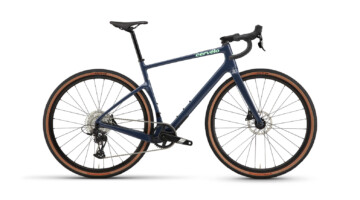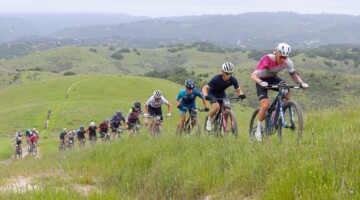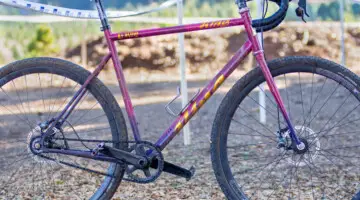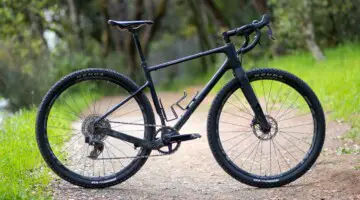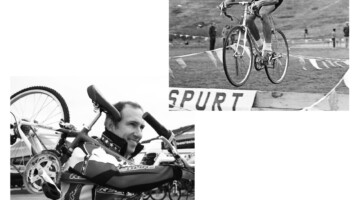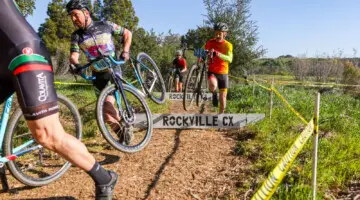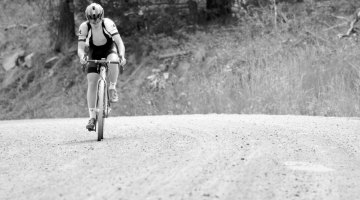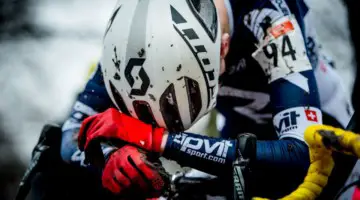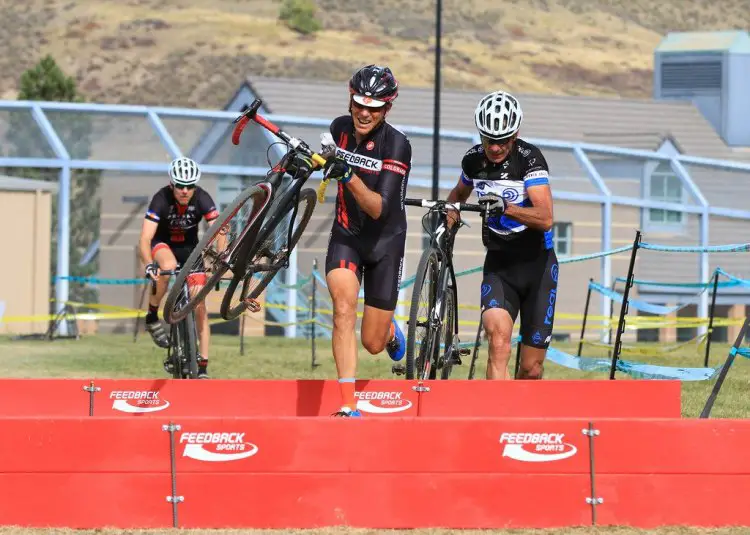
Lee Waldman, looking ahead to racing but remembering to look at the simple joys of riding a bike. © Annette Hayden
by Lee Waldman
Having been relegated to the basement and the trainer at least until March, I’ve had plenty of time to ponder some universal questions. For example, what really does happen to that one sock when it disappears in the dryer? Or, more in keeping with the focus of this magazine, what makes someone a good cyclocrosser? What are the physical and mental attributes that contribute to success in the ’cross world? Think Lars van der Haar for instance. Little guy with an overabundance of fast twitch muscle fibers. How different is he from Klaas Vantornout? Is it head, heart or legs that makes a difference?
The question comes from a recent conversation between my wife and me. She helps support my cyclocross addiction through her consulting. One of her areas of focus is a concept called Strengths Based Development based on Clifton StrengthFinders®. To put it in simplest terms, the process is derived from an assessment that identifies the presence of core talents, talents that we each have. In the system there are a total of 34 more general talents. They are ranked from the most to the least prominent, making up the sum total of who we are.
The most compelling reason for understanding your talents is so you can then invest in them through practice; developing skills and knowledge. As with anything worth developing, practice makes permanent if not perfect. It is then that your talents will become strengths.
Granted, the system was developed in the business world, but my theory is that many of the themes are present in the riders you line up against every weekend. Let’s look at some of the traits that I believe make up a good cyclocross rider. I’ve listed them in no particular order of significance. I just wanted to demonstrate that I know the alphabet. As you’re reading, ask yourself, where do I fit in?
ACHIEVER – These are the people who possess a strong work ethic and tremendous stamina. And they never, EVER, rest on their laurels. Once one goal has been reached, immediately there’s another one set. Achievers thrive on staying busy and producing. Think about it for a moment. Are you, or someone you respect as a rider, the kind of person who can’t be satisfied with the results they’ve gotten. The most successful riders are always looking for and working towards the next goal. The best racers, the ones we all look at and wonder what they do to be so consistently at the front, are the ones who are willing to put in the grunt work.
ACTIVATOR – This trait goes hand-in-hand with Achiever. Activators turn thoughts into actions and are often impatient. They can’t wait to get started and they believe that the best way to learn is to jump in with both feet. You can’t just think about being a successful racer. You need to do something about it, and you need to do it NOW. Activators also learn from their experiences, both positive and negative. How can you learn and grow if you haven’t done anything? That’s what they want to know. We all wish that we could just think about fitness and have it magically appear but it doesn’t. I know that I would love it if I could just visualize winning and all of a sudden I’d be crossing the line ahead of everyone else but, again, it takes focus and hard, hard work, day in and day out.
ANALYTICAL – Analytical people look at a situation and take into account all of the factors involved. They are the questioners. They want you to prove your theories to them. Why do you want me to train that way? What makes you think that’s the best set up for your bike, the best line through that corner, and on and on. Analyzers want to understand, which is why they approach each training block, each race in such a deliberate manner. How many columns have you read advising you to take your time during warm up and slowly ride a course analyzing if for the hidden / best lines? Have you listened? If not you’re missing one of the most important steps in racing well. Watch the “good guys” next time you’re at a race. They take their time, they ride the course slowly. They look for the best lines, not necessarily the popular line but the one that’s the fastest. And then, they increase the speed until they can ride the course at race pace, but only after they’ve thoroughly analyzed it.
ARRANGER – These people organize things but also maintain an attitude of flexibility. They look at all of the pieces; the elements of a cyclocross course for example, and make decisions about how to fit them all together for maximum success. I.E. the most efficient and fastest way around a cyclocross course. But, cyclocross courses change from the first lap to the last and this is where arrangers thrive. They can see the alternatives and go with them. Without that ability to change, you are digging yourself a deep hole. Without it, you’ve proven that definition of insanity – doing the same thing repeatedly while hoping for a different outcome. If the line you’ve chose isn’t working, be flexible. Change.
COMPETITION – Competitors need to compare themselves with others, and they need to win. Need I say more?
DELIBERATIVE – Deliberative people take their time with decisions and anticipate obstacles. Almost sounds like a broken record, doesn’t it? Ask yourself – which line should you take into that corner to come out in the best possible place for the following one? Think through the results, and then make a decision based on the data. Where should you line up at the start in order to not get boxed out before you reach the first corner? Without asking those strategic questions you’ve almost relegated yourself to the middle of the pack before you’ve even started the race.
DISCIPLINE –Disciplined riders set goals, both long and short term and then they monitor their progress. Do you enjoy the routine and structure of a training regimen? Does your racing and training life need structure? Mine does, which is why I rely on my coach to tell me what to do. Part of being an athlete is learning the discipline that it takes to get through the hard training days which directly translates into making it through the hard races. Discipline is key for any athlete, just sayin’.
FOCUS – Almost like discipline, focused riders know where they are going. These people pick a direction and then follow through. Focus did not show up as one of my top 5, but without it I wouldn’t have made it through these past two years of injury and recovery. I set a goal, to recover, and then decided the direction I needed to take to get there. Any of us who set season long goals and create a plan, have focus as a strength.
LEARNER – O.K. it may not be necessary for an accomplished ’cross racer to be a learner, but there is that aspect of cyclocross, the technique, that requires a love of learning. After all, it’s not completely natural to launch yourself onto a 130mm saddle or over a 40cm barrier. It’s not easy to convince yourself to jump off of a moving bike and throw it on your shoulder. Those are skills that need to be mastered. If you are one of those riders who is intrigued by the challenges that ’cross presents and excited by the prospect of learning even more, then you are a learner. For me, and maybe for you, the process of figuring out the new and unknown is equally as exciting and even motivating as the win. While it may not result in your standing on the top step of the podium, being a learner won’t hurt either. After all, in racing, as in life, there is always more to know.
MAXIMIZER – Here’s a trait that I have to believe every successful ’cross racer has to some extent. Maximizers work to move from good to great. They do not accept mediocrity. You may be a good bike handler, climber, etc., but to be the best means to never accept good but to always be working towards great. The old dictum train to your weaknesses really holds true here. Improve on what you already do well, but understand that to be truly successful you need to honestly look at your weaknesses and work to strengthen them.
POSITIVITY – Do you get excited about the mere idea of riding and racing your bike? Without that contagious enthusiasm, you might not be as successful. You have to LOVE cyclocross to really excel. You are the person everyone wants to line up next to because you truly believe it is good to be alive and that no matter what this will be a great race.
RESTORATIVE – How often to do you sit down either by yourself, with a teammate, or with a coach after your race and analyze the good, the bad and the ugly? If you have Restorative as a strength, I’d bet that you do. You are a problem solver. And if you are, it may move you towards great.
SELF-ASSURANCE – Let me ask, can you achieve success without being confident in your own ability? I would think that it would be almost impossible to achieve. Self-assured riders just know that the decisions that they make in the race and in the days / weeks / months leading up to the season, are the right ones.
STRATEGIC – Strategic thinkers have a tendency to create alternative approaches to problems, whether it’s a different line though a corner, or deciding to run a section rather than ride it, if you are strategic, this can lead to success.
Well that’s it. Easy huh? All you need to do to be successful in ’cross is have all of those personality traits! Not really. But what you do need to do is maximize the ones that you are the strongest in and work to shore up the rest. We all have 5 that come to the surface as our strongest. Be honest and look at the ones I’ve described. Are they you? If any of these are a talent you have do you invest in it through practice and developing the skills? It is only then that your talents become your strengths. I’m not saying that you can’t be good without them but what I am saying is that, in my humble opinion, the best ’crossers exhibit at least many of them.

